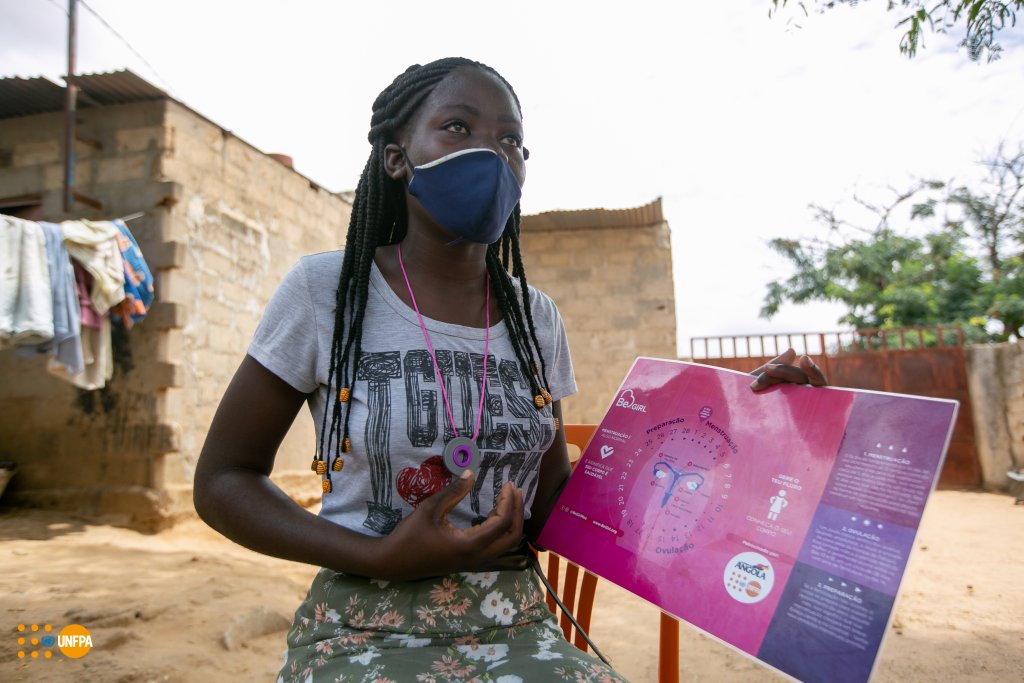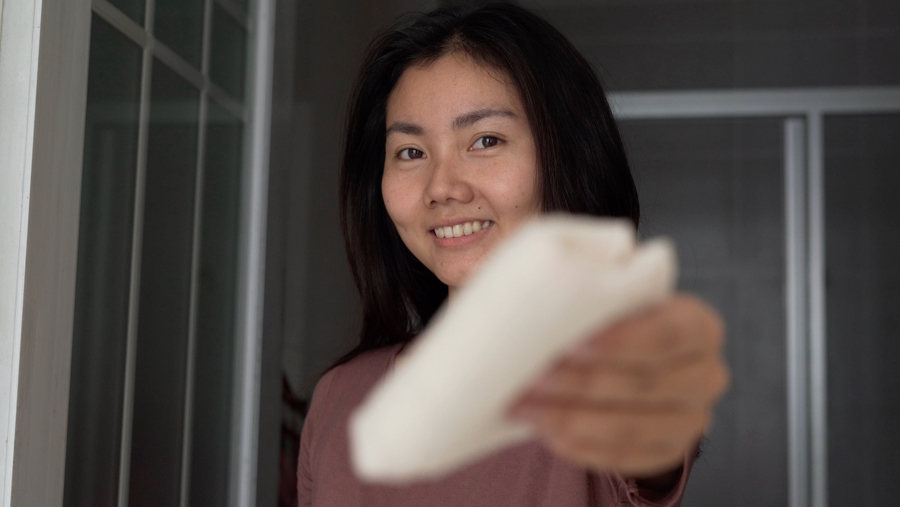Menstruate With Dignity, No Matter What

Every month, about one-quarter of the world’s population has a period. For many menstruating people, this is a normal and healthy part of life. But for others, menstruation can be a source of discomfort, stress, and isolation.
In some communities, periods are seen as unclean, impure, or cursed. As a result, some communities force menstruating people to isolate from others. For example, menstruating people may be unable to live in their family home or to participate in religious or social activities. Other women and girls may live in situations, like in poverty, refugee camps, or conflict zones, where access to menstrual products is limited. Sometimes, women and girls resort to selling their belongings or engaging in transactional sex to afford menstrual products. And many women and girls experience menstruation disorders, like premenstrual syndrome (PMS), painful cramping, irregular periods, and endomitriosis. Those who cannot manage their periods due to lack of products or pain may miss school, work, or other social opportunities. Collectively, this can be detrimental for women and girls’ lives and futures.
Shedding Light on Menstruation

May 28 is Menstrual Hygiene Day. The day brings together communities, world leaders, and advocates to normalize menstruation and address issues that menstruating people face. Last year, the United Nations Human Rights Council addressed menstruation issues. The oraganization passed a resolution asking that women and girls’ access to information, products, and facilities that support healthy periods be protected. As a supporter of UNFPA, you are already doing this work. But, with your help, we can do even more. Donate today and reach more women and girls with this critical support.
Here is how we help women and girls manage their periods:
Dignity Kits

“I lost everything, even my health passport,” said Monica. She and her family had to relocate to a refugee camp when a storm flooded their home in Malawi. In crises like these, women and girls often lose access to even the most basic necessities. And, violence toward them tends to increase. To ensure women and girls are safe and healthy, we deliver dignity kits.
The kits contain basic hygiene items like reusable menstrual pads, soap, and underwear. By providing these items to women and girls, we ensure they can manage their periods safely. They do not have to resort to transactional sex—which can expose them to violence—to get what they need. In some emergencies, we distribute the kits in coordination with the United Nations World Food Program, so women and girls can access food along with health products. In Malawi, we distributed 6,600 kits to women and girls like Monica.
Comprehensive Sexuality Education

Because menstruation is a taboo topic, girls may not understand what is happening when they have their first period. This was the case for Anne, a woman in Kenya. Anne also lives with a disability. Many people with disabilities have limited access to sexual and reproductive health information because they are seen as asexual or their caretakers feel uncomfortable sharing this information. But, every person needs this information. As Anne explains, “Because of a lack of sexuality education, many girls with disabilities turn to their friends for information, which can sometimes be misleading and dangerous. Some have been told that to manage their periods, they needed to have sex, and they end up with early and unwanted pregnancies.”
Today, with support from UNFPA, Anne leads sessions on sexuality for people with disabilities.
Empowering Girls to be Leaders

UNFPA reaches girls in vulnerable communities with classes on sexual and reproductive health and rights. Through these programs, UNFPA empowers girls to become peer educators and reach their friends and classmates with this essential information. Monalisha, a girl in India, used her training to reach her peers with information on menstruation. She was “terrified” when she had her first period. Monalisha explained, “In my village, my mother and all my friends would use and re-use the same cloth during their period, which would lead to infection.” By reaching younger students with accurate and direct information about menstruation, Monalisha ensured her peers were safe and healthy. She even helped some girls address their anemia.
Creating Sustainable Menstruation Solutions

In Myanmar, millions of people require humanitarian assistance, including women and girls living in refugee camps. Ei Ei, one woman living in a refugee camp, explained, “Sometimes I have to use pieces of cloth during my period. It is not hygienic or convenient, but I have no choice. Without proper menstrual hygiene support, we women are losing our dignity.”
To address the needs of women and girls, one UNFPA partner trained women to make reusable menstrual hygiene pads. The program serves a dual purpose—to help women and girls manage their period and help them earn an income. Ma Wai, who learned how to make the pads, explained the impact of the program. She said, “Women in our community have income. Our products are delivered to the women and girls in the displacement camps who need sustainable menstrual health hygiene management supplies and information. As a local youth, I feel empowered.”
Raising Awareness about Menstruation-Related Issues

We also amplify the voices of women and girls who are confronting menstrual health taboos. In the Middle East and North Africa, a UNFPA survey that found that many girls felt shame, fear, anxiety, or embarrassment during their period.
One girl in Palestine shared, “I felt ashamed of my body. I did not know how to clean it or how to take care of it. I did not understand the purpose of my menstrual cycle because I did not receive any sexual health information at that age. For years to follow, I felt heavy and helpless at that time every month. It wasn’t until very much later, when I was in my twenties, that things made more sense.” Another girl in Morocco remembered her first period. She said, “I told my mother. She gave me an old piece of cloth and refused to buy me pads and forbade me from eating dinner that night… My period every month became an unbearable hell.” We took these responses and shared them with our menstrual health partners and used them to inform our approach to menstrual health care.
You Can Be There
Today, thanks to you, women and girls across the world now have the support they need to have healthy periods. Through dignity kits, comprehensive sexuality education, empowerment programs, and advocacy, we are working to reach every woman and girl with the care she needs to be safe and healthy.
As one woman in Iraq said best, “Don’t care [what others think] and live your life. There’s no need to feel shy or shame…. It’s a superb natural biological process.”
Join us in making healthy periods possible. Donate today.
-Dana Kirkegaard